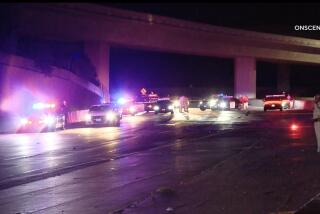Wake-Up Call for Drivers
- Share via
The scariest moment I’ve had behind the wheel of a car was driving cross-country and running off the shoulder because I’d nodded off. I was driving long hours on little sleep to shorten the trip.
We hear constantly about the dangers of drunk driving. But fatigue is a major cause of accidents that gets less attention. A Cable News Network study that aired last week listed fatigue as possibly the second-greatest driving danger next to alcohol.
The problem is statistics on fatigue are almost impossible to keep, said California Highway Patrol spokeswoman Joann O’Hair.
CHP statistics for 1997, the latest available, list falling asleep as only the seventh-highest cause of traffic fatalities statewide. But fatigue can be a factor in any number of other types of accidents, including drunk-driving incidents.
For example, when CHP Sgt. John L. Steel was killed in Santa Ana on his motorcycle in 1993, the driver who pleaded guilty to vehicular manslaughter admitted he had been drinking that night. But the major cause of the collision was fatigue, according to prosecutors.
Fatigue often doesn’t wind up on official accident reports.
“If you rear-end someone in a car, unless you tell us the problem was you were tired, we won’t be able to note that on the report,” CHP Officer Denise Medina said.
Law enforcement officers call serious fatigue cases “highway hypnosis”--when the white line in the middle of the road helps lull a tired driver into dozing off.
Too many drivers believe that substitutes for sleep are sufficient crutches for remaining alert--rolling down your window, turning up the radio, drinking extra coffee.
“Fresh air from the window does help,” Medina said. “But that’s good for only about 15 minutes. If you need to roll down your window to stay awake, you really should get off the road immediately.”
The biggest problem to Medina is the one I confessed above: On long trips, too many people drive too many hours in a day just to make their trip shorter.
Another issue Medina brought up is the sleeping passenger.
“We like to recommend that you travel with someone else instead of alone,” Medina said. “Talking with a passenger can keep your mind stimulated.”
But it’s no help, she said, if the other passenger is asleep: “Just a few weeks ago we had a husband and wife both seriously injured because he fell asleep at the wheel. She had been sleeping at the time. Even if he was tired, if she’d been awake, it might have prevented that accident.”
Contrary to what some might think, police officers don’t always pull you over so they can fatten their ticket book. If a driver is swerving and a CHP officer determines that fatigue is a factor, the officer will usually just tell the driver to pull off at the next exit and get some rest before going on. “You’d be surprised what even just 15 minutes of sleep can do to help you,” Medina said. “It might at least be enough to get you home safely.”
In the ideal world, we’d have CHP officers all over the roadways watchdogging those people driving carelessly because of fatigue.
“It used to be that way,” said the CHP’s O’Hair. “But now our officers seem to be constantly running from one trouble spot to another. We don’t have the time just to patrol anymore.”
The solution, he said: We just need to get more sleep before we drive.
“You know what our freeways are like,” O’Hair said. “Some days it’s just a mess out there. If you’re not alert, you really should get off the road.”
More to Read
Sign up for The Wild
We’ll help you find the best places to hike, bike and run, as well as the perfect silent spots for meditation and yoga.
You may occasionally receive promotional content from the Los Angeles Times.






